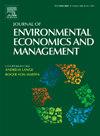资源横财、互联互通和政治两极分化
IF 5.9
3区 经济学
Q1 BUSINESS
Journal of Environmental Economics and Management
Pub Date : 2025-05-08
DOI:10.1016/j.jeem.2025.103164
引用次数: 0
摘要
自然资源带来的意外之财会使政治观点两极分化吗?我们发现,在政治参与度(连通性)较高的社会中,答案是肯定的。意外之财引发了公众对其使用的争论。一个民意竞争模型预测,在高度社会连通性下,资源引发的公共辩论允许极端分子肆无忌惮地控制话语,从而导致两极分化加剧。利用美国几十年来关于政治观点的详细个人数据,我们首先证实,积极参与政治话语与更极端(两极分化)的观点有关。其次,我们通过检验各州连通性水平和资源意外之财的貌似外生变化对个人政治观点的影响来检验模型的预测。我们的基线估计表明,资源意外之财的一个标准差导致居住在高连通性状态的个人的情感两极分化增加4%。我们的研究结果揭示了迄今为止被忽视的自然资源丰富的不利影响,以及政治两极分化的动态。本文章由计算机程序翻译,如有差异,请以英文原文为准。
Resource windfalls, connectivity, and political polarization
Can natural resource windfalls polarize political opinions? We find that, in societies with heightened political engagement (connectivity), the answer is in the affirmative. Resource windfalls spark public debates over their usage. A model of contest over public opinion predicts that under high societal connectivity resource-induced public debates lead to elevated polarization by allowing extremists unbridled control over the discourse. Employing detailed individual-level U.S. data on political opinions covering several decades, we first confirm that active participation in the political discourse is associated with more extreme (polarized) opinions. Second, we test the model’s predictions by examining the impact of plausibly exogenous variations in states’ connectivity levels and resource windfalls on individuals’ political opinions. Our baseline estimates show that a one standard deviation of resource windfalls induces a 4% increase in the affective polarization of individuals residing in high connectivity states. Our results shed light on hitherto overlooked adverse effects of natural resource abundance, as well as on the dynamics of political polarization.
求助全文
通过发布文献求助,成功后即可免费获取论文全文。
去求助
来源期刊
CiteScore
8.00
自引率
4.30%
发文量
91
期刊介绍:
The Journal of Environmental Economics and Management publishes theoretical and empirical papers devoted to specific natural resources and environmental issues. For consideration, papers should (1) contain a substantial element embodying the linkage between economic systems and environmental and natural resources systems or (2) be of substantial importance in understanding the management and/or social control of the economy in its relations with the natural environment. Although the general orientation of the journal is toward economics, interdisciplinary papers by researchers in other fields of interest to resource and environmental economists will be welcomed.

 求助内容:
求助内容: 应助结果提醒方式:
应助结果提醒方式:


